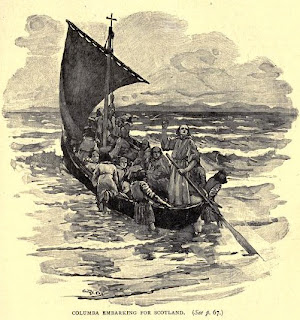Although modern scholarship seems to take the view that the exile of Saint Columcille was a voluntary one, for previous generations his banishment from Ireland following the battle of Cúl Dreimne was a powerful motif. In the poem below, the writer depicts the saint as accepting the penance of exile in the same spirit as Our Lord accepted His cup of sorrow. The idea of uniting our own sorrows to those of Christ in His passion was a typically Irish Catholic way of dealing with life's hardships, and in 1874 when this poem was published, the Great Famine, when a million people were driven into exile, must still have been very much in the public consciousness.
ST. COLUMBA'S PENANCE.
“WOULDST thou, Columba," Molaise said,
"Change into love God's hate-
Hate for thy sin, which blood hath shed,
And homes made desolate?
The law hath passed of Nature's Lord,
Sped forth the arrow of His word,
Swift bearing this decree,
That thou from thy dear land depart,
And Ireland, country of thy heart,
Thou ne'er again may see."
"Mercy!" he cried, in accents wild,
"Stay, stay, O God, Thy hand.
Let me not be for life exiled
From Erin Fatherland.
As clings the vine to widowed elm,
As he whom angry waves o'erwhelm
Grasps solitary spar,
So doth my heart to Ireland cling:
Then from its shores, my God, my King,
O! send me not afar."
But mem'ries come of Olive Mount,
Which saw a God-man weep,
Weep blood, when first of sorrow's fount
He drank the lowest deep.
Which heard, "Oh! Father," Christ exclaim,
"In pity, let this cup of shame
Pass from Thine only Son.
Yet tho' from ignominy and toil
This frail humanity recoil,
Thy holy will be done."
"Thus spake the Saviour, and shall I
His chalice cast aside?
Shall I contend with God on high,
His sacred will deride?
Oh! no, though suffering nature faint,
Though from my soul break forth the plaint
Of bitterest agony,
Let me in Jesus’ anguish share, —
Let me a life-long exile bear,
Dear Ireland, far from thee."
W. O. F.
The Irish Monthly, Volume 2 (1874), 504
Content Copyright © Trias Thaumaturga 2012-2015. All rights reserved.
Content Copyright © Trias Thaumaturga 2012-2015. All rights reserved.


No comments:
Post a Comment